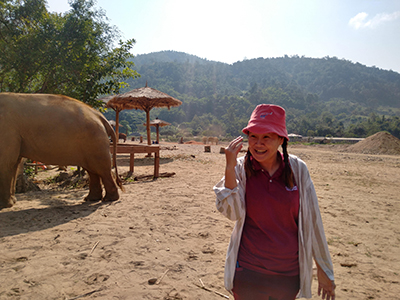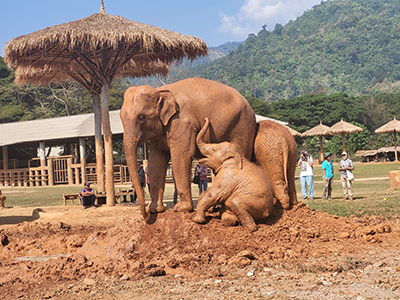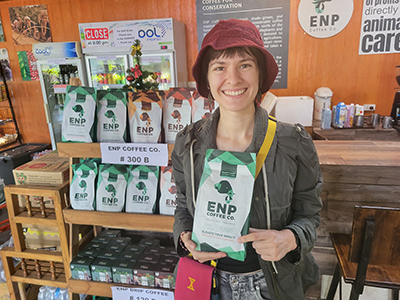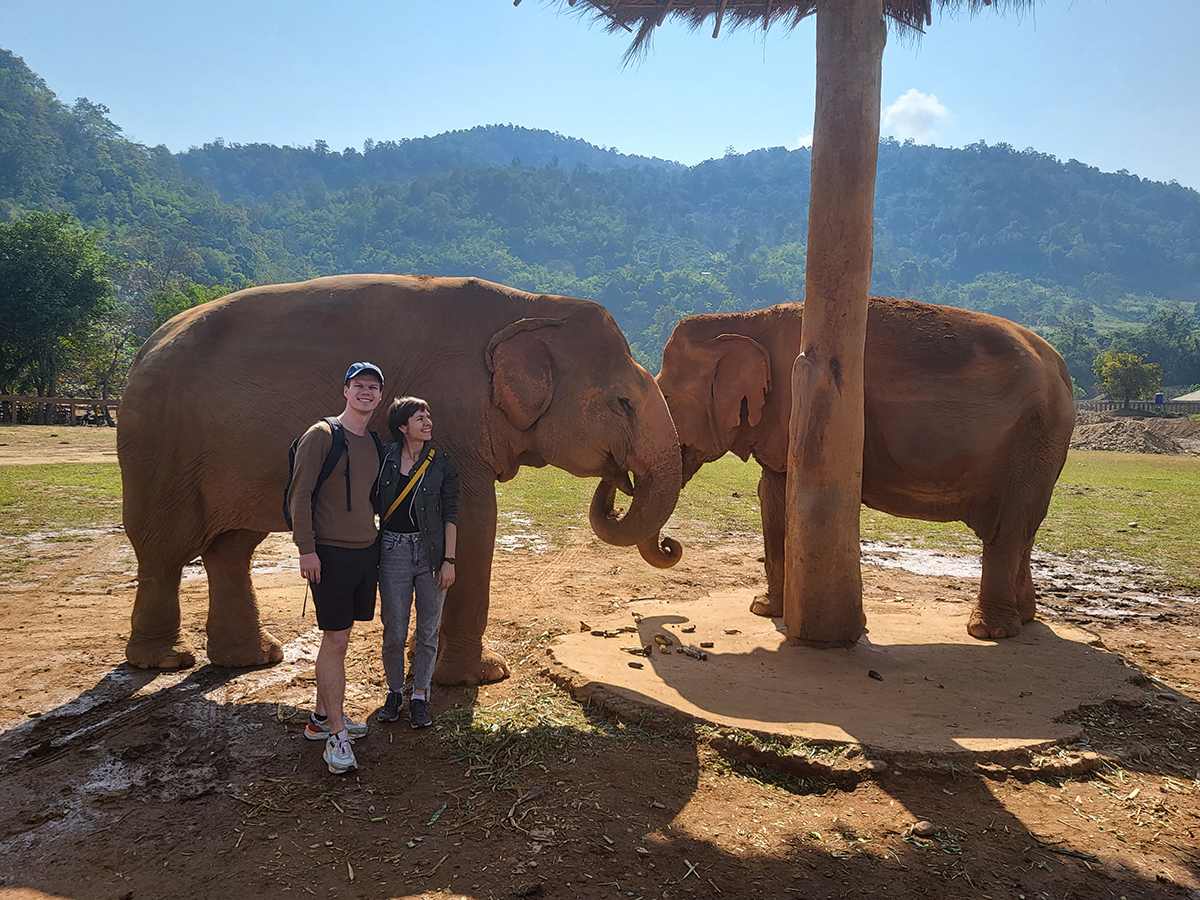You want to pet elephants where the pachyderms are treated well? Then the
Elephant Nature Park (ENP), which inspires with its harmonious atmosphere, will be just right for you. Here you can also do something good for the environment and the animal world during your holiday in Thailand. Come with me on a discovery tour through the ENP.
Remember Ken from the
Thai cooking class? He recommended the ENP to me. Moreover, this organisation appealed to me because of its founder
Saengduean Lek Chailert - "Lek" for short. Lek is an award-winning environmental activist who has put her heart and soul into the welfare of elephants in Asia for 20 years. Furthermore, in the documentary "
Love & Bananas: An Elephant Story", she is accompanied in the rescue of an old, blind elephant. Lek's passion for elephants stems from the fact that her grandfather - a shaman and traditional healer - was given a grey giant as a gift for saving a young man's life. Lek therefore spent a lot of time with this elephant. This animal-like friendship was the cornerstone of why she founded the sanctuary. When I read this, I knew I had to go here.
The day at Elephant Nature Park started with a 60 km drive into the Countryside. From the moment we drove in, we saw free-roaming animals of every kind. Dogs happily walking around, groups of elephants standing together and water buffalo grazing among the grey giants. I didn't even notice the other 400 dogs in the Rescue Shelter and 2,000 cats in the Cat Kingdom, the wild boar and the handful of horses at first glance. By the way, each of these animals has its own basket or stall. True to the motto: "Everybody has a home."

With a warm smile, the local tour guide Beebee welcomed us. Beebee, who is already a member of the original staff and probably knows the animals better than her own family, tells us first of all that all the animals living here were rescued from bad conditions or partly donated to this sanctuary. To accommodate all these creatures, the area stretches over 500 hectares. It is divided by a river in which the pachyderms can bathe alone. On one side is the tourism centre and the elephant ladies and families with their babies. Here we were allowed to spend the whole day. On the other side of the river there are only young bulls and elephants that have been badly treated and are now allowed to rest there.
Beebee introduced us to every elephant we met by name. After 13 years at the ENP, she knows all the animals and the resort like the back of her hand. She was even able to do a trunk high-five with a lady elephant. That's how well-adjusted the two of them are. When she started here, they had 15 pachyderms. Now there are 116. 96 of them are female and only 10 male, because the bulls need more space and extra huts.
First we met the two old ladies Pikun, which means flower, and Kunjai, which means granny. Pikun is 60 and Kunjai is 85 years old. After they finished eating, we were allowed to pet them. The concept here is that not every elephant can be touched. Depending on their character, they come towards you or stay at a distance, disinterested. Our guide showed us who wanted to cuddle with us. This freedom that the animals enjoy here struck me especially during our walk through the park. The elephants can play with their friends and families and go wherever they want.
Well, almost everywhere. The elephant handlers, also called mahouts, actively look after the animals and make sure they don't leave the grounds, because this is the only place where they are protected. They also make sure that the animals don't get into mischief. Otherwise they would massacre fences and eat the leafy roofs. 2-3 mahouts are needed per elephant. "The mahouts don't choose the elephant, the elephants here choose their mahouts," Beebee explains. Isn't that cool? You can choose your own mahouts. The mahouts here work according to the "saddle off model", which is based on love, understanding and respect. This is because the anatomy of the animals is not designed for riding. Hooks and sticks, which are unfortunately still often used, are also prohibited here. Instead, only the voice is used here. I was allowed to watch a young mahout at work, as he led a large giant using only the sound of the snaps and his position. Very impressive.

It is wonderful to see how humans and animals can live together. Beebee told us that there is now a new generation of young, happy elephants here who can grow up without traumatic human experiences. Instead, 1 ½ year old Chaba and two year old Beemai have grown up with friendly dogs, from whom they have even learned to play with sticks.
A total of 300 people work at the ENP. From construction workers and gardeners to service staff and tour guides, everything is needed here. By the way, Ken from the Thai cooking course was also employed here. ENP works closely with locals and indigenous peoples, who find fair working conditions here. As part of their jobs, employees can further their education and acquire skills in handicrafts, social media and gastronomy. I find it particularly sustainable that the ENP integrates the local farmers: they can pick up manure and compost for their farming every day free of charge.
Do you want to become part of the team? Then you can do voluntary work here as an individual. Like the young Frenchwoman Stephanie, who chops fruit for elephants and mucks out the stables. When Stephanie came to Thailand, she wanted to make her dream come true and experience elephants up close. But like other tourists, she was deceived by supposed elephant rescue centres. On the outside, the companies appear to be animal-friendly, but in reality they are not kept in a manner appropriate to the species. Shocked by this, she did some research and is now a volunteer with ENP. She can only recommend it, she told me in the gift shop.
It is professionally organised, you are needed and create a real IMPACT. Without western volunteers, the ENP would not function as it does. You work at eye level with the locals who guide you.

So next time you plan a trip to Thailand, make sure to leave room in your IMPACKT suitcase for the sustainable coffee and the handmade jewellery of the staff - and put the Elephant Nature Park on your bucket list.
Best regards,
Yours Franzi









